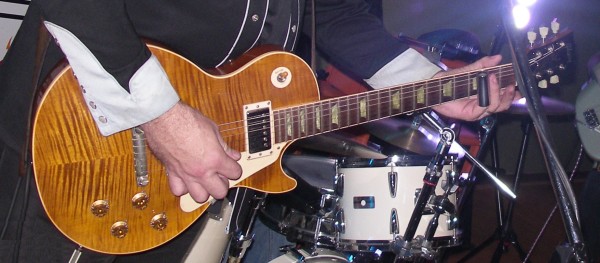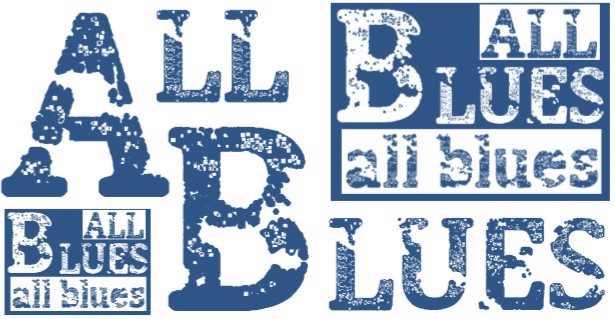| Accueil/Home | Radio Blues Intense | Sweet Home RBA! | All Blues | Dixie Rock | Carrefour du Blues | Interviews | Liens/Links | Contact | Powerblues |
Tom Coerver
Interview by Luc Brunot.
Original version of the interview published in Bands Of Dixie #80 (May - June 2011)
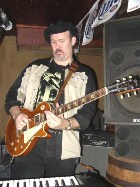
This guy is tireless. He's not only a guitarist or a keyboard player or a drummer or even a singer, no, he's a guitarist and a keyboard player and a drummer and a singer! And besides that, he was, and is part of an incredible number of bands... He never stops. And furthermore he's a nice guy; that's why we were really pleased having him interviewed... Last but not least, his name is Tom Coerver.
Hello Tom,
On your new album, "Wood, Wire, Vibes... & Slide", you play all the instruments. Did you already practice these instruments in your youth?
On your new album, "Wood, Wire, Vibes... & Slide", you play all the instruments. Did you already practice these instruments in your youth?
I started on piano at age 7 and took lessons at school for about 4 years. I got interested in the drums when my cousin got a drum set for Christmas in 1968 when I was 10 and I begged until next Christmas and my folks got me a cheap Sears drum set (made by Pearl, believe it or not!) and then the guitar came into my life at 13 when my pal Jody Turner had a cheap Teisco electric guitar. After that, I saved money from mowing yards and bought a Ventura Les Paul copy guitar that looked just like the new Joe Bonamassa Gibson / Epiphone model - that was a flashback to 1973.
You spent your youth between Baton Rouge and Houston. How did you develop your musical training?
I took drum lessons in Houston from a great teacher named Denny Hair who had an 8-piece band with a horn section and they played lots of Chicago and other rock/pop favorites and Denny got me to sit in with his band and the guys gave me lots of good tips about playing with a band such as "follow the bass guitar with the kick drum" and "play for the song - drum fills go between verses and choruses" and so forth. I started playing guitar by ear and learned some parts from Cream and Creedence records and then later when I started playing in bands in High School the guitar players (Ed Gassie, Tim Lawson, etc.) showed me little licks and chords and I kept building from there and I later took some piano and music theory classes in college from a music major named Laura O'Leary who was a friend of a friend. When I moved to Jacksonville, I met a great keyboard player named Garius Hill in a music store and we became good friends and he showed me how to overcome some bad habits on the piano and organ and lots of chord voicings, fingerings for scales and more music theory. I also took guitar lessons from a great jazz guitarist in Jacksonville named Gary Starling and I still use several of the ideas he taught me about the diminished scale and so forth.
You've played with bands such as BooKooWattz and Lafauci. Was it your first bands and how old were you?
My first band was in late 1973 at age 15 in Houston and we never picked a name! Our family moved back to Baton Rouge in summer 1974 and I started playing in a couple bands (Southbound and Haze) while still in high school and then in early 1976 I got a job in a music store selling keyboards, guitars and PA equipment and one of the customers there was this funky black bass player who was playing with John Fred & The Playboys - Randy Jackson of "American Idol" fame about 25 years later - how strange is that?
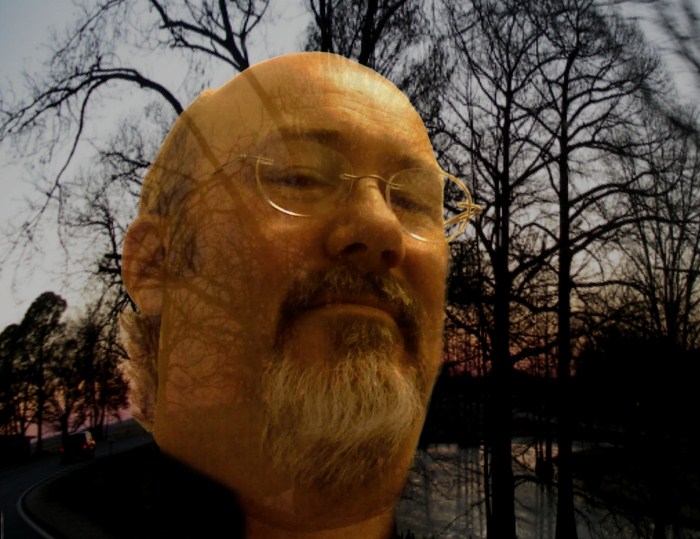
It seems to me that you were at the same time at the University. Did you succeed in combining studies and tours?
I did pretty well my first year at LSU with playing music and studies, but my second year was rough - I was trying to study in the back of LaFauci's van on those long trips to gigs when we were booked by an agent out of New Orleans and playing all over Louisiana, Mississippi and Arkansas and I had one semester (late 1978) where I made EVERY grade possible (including an 'F' in a math class!), so I cut way back on gigs until I graduated LSU in December of 1980
Did you record something at that time?
I recorded on drums with LaFauci / BooKooWattz in summer 1977 and we had a great time at J.D. Miller's historic studio in Crowley, Louisiana where Lightnin' Slim, Slim Harpo and many other Louisiana music acts made classic records but Sal LaFauci and the manager of the group parted company shortly afterward and the recordings never got released and the band broke up. Sal put together the band LaFauci with most of the same guys but he switched back to drums and did the "LaFauci" record in 1978 at Studio in the Country in Bogalusa, Louisiana and then one of the guitarists (Keith Guidroz) left the band and Sal had heard me jam on guitar with the other guitarist (Steve Dodds), so he asked me to take Keith's place on guitar in LaFauci and that's when my grades started slipping!
You then moved to Jacksonville for a job, in 1981 I believe. So you weren't a professional musician?
After a summer job in a chemical plant near Baton Rouge in 1978, I swore I would never set foot in another plant or job where explosions and toxic fumes were likely, so my friend Eric Hunter told me about his job offer from the Naval Air Rework Facility at Jacksonville Naval Air Station (NAS Jax) and I interviewed with them after the only job offers I got in Baton Rouge were in chemical plants. I took the job there and moved to Jacksonville, Florida in February of 1981. I was only playing music for fun at home and recording instrumental tracks with my trusty old TEAC 2340 reel to reel tape deck - that tape deck was a BIG part of my life (more on that later!).
Jacksonville is one of the Southern rock capital with Lynyrd Skynyrd, Molly Hatchet, 38 Special, Blackfoot, etc. Were these bands and the Southern rock influences for you at that time?
I was a big fan of Lynyrd Skynyrd, Rossington-Collins Band, The Allman Brothers and Blackfoot when I moved to Jax and I studied Duane's slide style after the Guitar Player magazine feature in 1981 explained how he used open tunings and standard tuning and his damping technique.
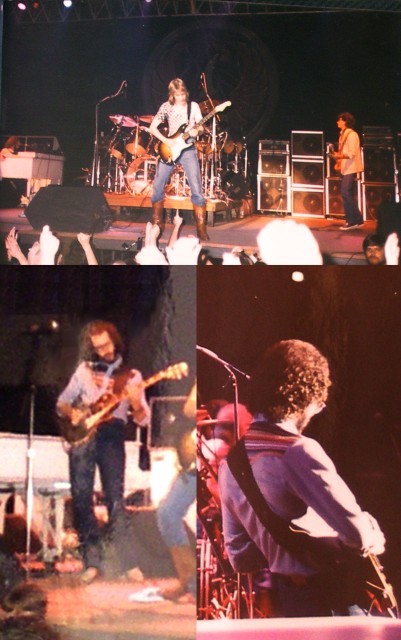
I guess then you had the possibility to see concerts of these famous bands?
In August 1981, I joined a band called The Philters and we had a friend named Jim Kelley who ran sound for The Johnny Van Zant Band and he got us into a bunch of great shows - especially the show where Blackfoot headlined and Rickey Medlocke blew my mind with his showmanship, singing and great slide and standard guitar playing. The Philters wound up opening for The Rossington-Collins Band at the Jacksonville Coliseum in early 1982 at what was to be their last gig, and that was one of the best experiences I've ever had in playing music! Our sound check got cut short, and Billy Powell felt sorry for me and said "you can put your synthesizer on top of my Hammond B3 and use my keyboard rig if you like" and Allen Collins let me use his spare guitar amp on the five songs I played guitar on and you can imagine how good that sounded!
Is it where you met Bobby Ingram? How did it happen?
Scott Montgomery of the Philters had played in Bobby's late 70's band called Rum Creek and Bobby came to see a couple gigs the Philters played when he was home in Jax and Scott introduced me to Bobby. Bobby was playing in The Danny Joe Brown Band and they broke up a little while after I met Bobby and he called me to ask if I could help them record some demo tapes with my trusty TEAC 2340 reel to reel tape deck in the summer of 1982. The Bobby Ingram Project was just forming and they already had a HUGE sound with Rik Blanz on second guitar doubling many of Bobby's guitar parts and I immediately loved their sound. Then The Philters broke up in January 1983 and I auditioned for several groups on both guitar and drums, and I had an offer to go to Japan on drums with Tom Skidmore & The Teen Angels (you can't make this stuff up - truth is always stranger than fiction!) when Bobby heard I was available and called to see if I'd play keyboards in The Bobby Ingram Project (BIP). I joined BIP in March of 1983 and we were writing and rehearsing six days a week right away.
On your website, I read in your biography that for six years, together, you have write and performed shows, that you opened for the Rossington-Collins Band, the Johnny Van Zant Band, Molly Hatchet, etc. Was it with the Bobby Ingram Project?
I played and recorded and wrote songs with BIP from March 1983 to June 1988 and we persevered through lots of disappointments and Bobby never lost faith, he always kept pushing us to keep writing and doing demos rather than go out and play cover tunes at little bar gigs. We signed a management deal with Pat Armstrong & Associates in 1984 and Pat's connections from managing Molly Hatchet, Pat Travers, Stranger, etc. helped open doors for us to do opening act gigs and get seed money from CBS to do some good demos in Orlando at Bee Jay Studios and to showcase for some important producers and record company A&R people.
Did you have some friends in these bands?
Danny Joe Brown, Dave Hlubek, and Riff West from Molly Hatchet were very friendly with us and came around to hang with Bobby and us, we did a benefit for the Jacksonville Food Bank and opened a show at the Florida Theatre in Jax for the Johnny Van Zant Band, and Don Barnes from .38 Special sold Bobby his killer 1969 Marshall Plexi amp and Basket Weave 4x12 speaker cab and he came around to check us out a couple times and was a real nice if somewhat quiet guy.
Do you have some good memories to tell us, some anecdotes?
Our old BIP bass player Jim Wheat tripping over the roadie Chuck at a gig at a big club in Jax called Playground South - Chuck had bent down to plug in Rik's guitar cord when it came out of a pedal, and Jim was backing up and didn't notice Chuck until he was sitting on Chuck's back and then Chuck rose up quickly and Jim landed back on his feet perfectly, but he was swatting all 4 open strings on the bass for about two seconds and the 12,000 Watt per side PA system we rented made it sound like a very short EARTHQUAKE has happened! Other highlights included showcasing in private auditions for big producers like Terry Manning, Geoff Workman, Tom Werman, etc. either at our beat-up old band room in Jax or at Bee Jay studios in Orlando, waiting for Elvis's ghost in the upstairs dressing room at the Florida Theatre (Johnny Van Zant was razzing us... he's a funny guy!), and finally, one time early on in BIP when we were doing a live radio interview at Jax's Rock 105 station and Danny Joe Brown called in and asked if he could speak to the "Penis with Ears" Bobby Ingram and we all just about choked laughing so hard. Bobby and Danny played together in a band Bobby had called Rum Creek in 1975 or so and they were good friends, but Danny liked a good prank every now and then.
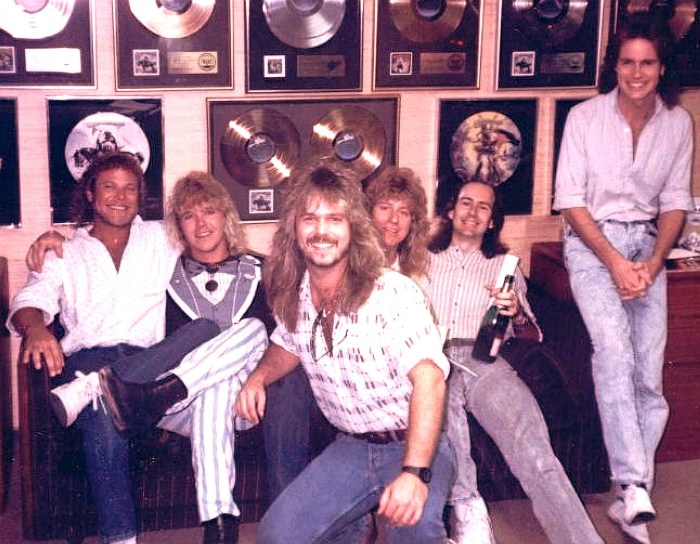
What kind of music did you play with the Bobby Ingram Project?
Sort of 38-Special meets Boston meets REO meets Allmans meets Night Ranger meets Blackfoot meets Styx meets Journey - we did some fancy demo recordings in late 1984 at Bee Jay Studios and we got a couple offers from A&M Records and Epic Records, but Pat Armstrong advised us to pass on them and find a new singer because the offers were weak, one-shot type deals and the feedback Pat was getting was that the singer at the time (Richard Smith) was not "heavy" enough for the music of BIP and that led to auditions and then hiring Ron Perry as the singer. Richard was a very good bass player and our original bass player Jim Wheat quit to join Johnny Van Zant's band in 1986, so then Richard switched to playing bass and singing harmony and then we had four strong vocalists and we started featuring the harmony vocals even more.
What was the line-up?
Me on keyboards (piano, organ and synthesizer) and harmony vocals, Bobby Ingram on lead guitar and harmony vocals, Kevin Taylor on drums, Jim Wheat and later Richard Smith on bass and harmony vocals, Ron Perry on lead vocals, and Rik Blanz on lead and rhythm guitar.
Did you record something?
We did a zillion demo recordings at the band room of songs we wrote and then when Pat Armstrong heard enough songs he liked, we'd go to Sterling Sound in Jax or Bee Jay Studios in Orlando to do some fancy, expensive demos for Pat to shop the band around for a record deal.
I also read that you also were an artist manager. Who did you manage?
I never really "managed" any artists, but I have produced recordings for several Baton Rouge area artists at my home studio including Tabby Thomas (with guests Chris Thomas King, Tab Benoit and Henry Gray), Chicago Al, John Lisi, Crosstown Traffic, Burton Gaar, etc.
When and why the Bobby Ingram Project was transformed into China Sky?
Pat Armstrong got BIP together with a hit songwriter named Frank Wildhorn in 1987 and one of Frank's songs for the project contained the lyric "under a China Sky" and the record company thought that would make a better name for the band than the Bobby Ingram Project. We found out about the name when we saw the STRANGE cover art for the record, and everybody hated the name and it quickly became "Chinese Guy" amongst the band members after that.
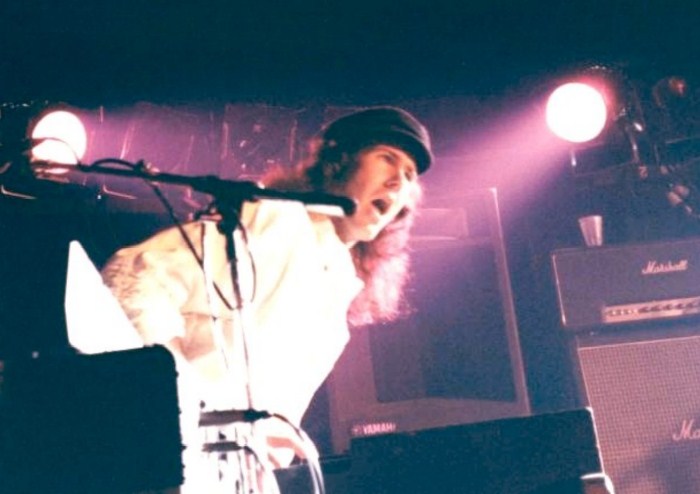
How did you deal with CBS for the China Sky album?
CBS signed a distribution agreement with Pat's new record label PARC (Pat Armstrong Recording Company) and Pat negotiated the contract with CBS for the money for recording (at the then-new PARC Studios built in conjunction with Full Sail Recorders and Audio School). Pat then was our manager, our record label president, and our recording studio owner - pretty CONVENIENT, huh?
It seems to me that you were not among the musicians who recorded the album. What is it due?
Pat hired Los Angeles-based hot-shot keyboardist/synthesist Bob Marlette (who is now also a big-time producer who did Skynyrd's "God & Guns" record) to help with keyboard and synth arrangements, drum and percussion sequencing, and bass lines and I played some parts uncredited along with Bob on four songs, but I was there for consultation, sound design, harmony vocals and cheerleading for MORE GUITARS, LESS ANNOYING 80s SYNTHS the whole time during production. Pat fired the guitarist Rik and the drummer Kevin before we started production, but not until he had gotten all of us to do a mandatory showcase for the new CBS/Sony executives to prove that we were worth spending their money on. After I saw the cover art and the CHEESY photos of Ron, Richard and Bobby on the back cover and then heard the third and final remix/remastering of the record, I was glad that my picture was not on that goofy piece of crap record and I only liked about four of the songs, one of which had to be dropped from the final cut because it was WAY too similar to a certain hit single by Bon Jovi. I liked the music that Bobby, Richard, Ron and I wrote much better than the lowest common denominator pop crap that Frank Wildhorn co-wrote. However, I thoroughly enjoyed working with Bob Marlette who showed me some really hot keyboard licks that I still use today and Karl Richardson taught me some great production tricks and was a lot of fun to hang out with. Frank was a general pain-in-the-ass from day one and the only reason I even appeared on that record is that Pat liked my high harmony vocals and thought they were important to the BIP/Chinese Guy sound. Of course, Pat later fired me too for being "too scary looking for the little girls" after he got what he wanted out of me. He was nice enough to release me from the contract and my recoupable one-sixth share of the $250,000 worth of expenses that we had run up recording the record and doing demos from 1984 through 1987.
The band made only one album. What happened next?
Ron and Bobby hated each other and when the record flopped, they decided to go their separate ways. Bobby had already been in Molly Hatchet for around three years after taking Dave Hlubek's place when Dave left Hatchet in 1986 or so.
Are you still in touch with Bobby Ingram? He never asked you to join him in Molly Hatchet?
Our mutual friend Michael Buffalo Smith keeps me updated on all things Ingram, but I haven't seen or spoken with Bobby since 1995 when Hatchet played Baton Rouge and I went by to see them. Danny's diabetes was causing major problems with cancellations and such, but they sounded great that night and the only thing I noticed about Danny was a slight limp and he was very friendly and I had a nice long talk with Bobby that night after the gig and he told me to appreciate the security of my engineering job at GEC where I've worked for over 20 years now.
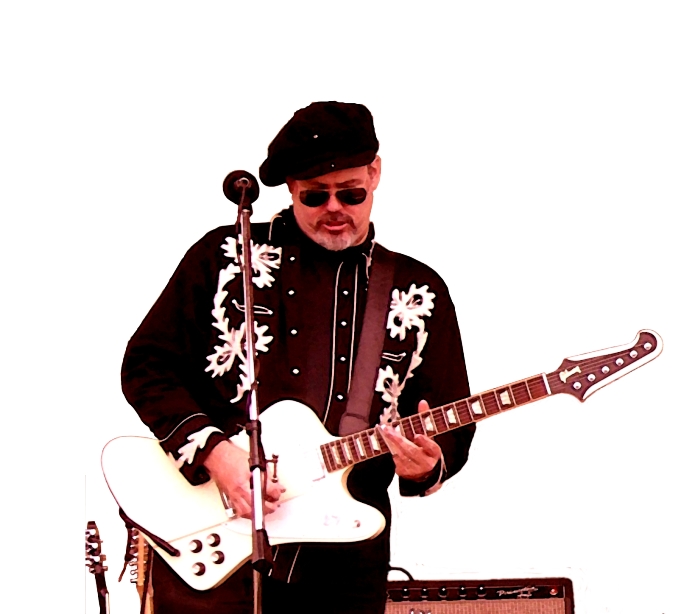
Then, you set up your studio, you recorded and performed with some Louisiana musicians such as Rockin 'Tabby Thomas, Larry Garner, Tab Benoit, etc. Can you tell us about that?
When I moved back to Baton Rouge, I played in several bands while I went back to school to get my Masters degree and I met lots of folks in the pop, blues and rock scene around Baton Rouge and that led to my playing with John Lisi who was Tabby Thomas's guitarist from 1998-2000 and then John got me to play keyboards with Tabby and that led to the blues connections along with attending many Blues Jam Thursdays at local club "Phil Brady's" and that's where I met and jammed with Larry, Raful Neal (Kenny Neal's dad who was a legendary Baton Rouge Blues singer and harmonica player), Henry Gray, The Delta Rockets, Rudy Richard and James Johnson from Slim Harpo's band, and several others.
Only blues?
Mostly blues, but some pop, rock, folk and R&B gigs along the way on both guitar and keyboards.
Do you still do that?
I was diagnosed with Prostate Cancer in 2008, and the prostate removal surgery slowed me WAAAYYY down for the last couple years, but I've started playing a bit more with a 60's pop band called Timewarp and my blues/R&B buddy Burton Gaar as well as acoustic duo gigs with my old friend Patty Houk - we've been doing Tom & Patty duo gigs for over 15 years now!
And how is now the health?
I'm grateful that the cancer was detected very early and the surgery was successful. The tumor was very small, but it was close to my bladder and that was why the doctor chose to operate right away. I have a friend whose cancer spread from the prostate to his bladder, and the radiation treatment was pretty BRUTAL but it cured his cancer and saved his life. I am so thankful that I didn't have to go through the torture that he endured, and we are both cancer-free (PSA went to zero) now. As usual, after the surgery I went into "live music withdrawals" during the month of recovery and I tried to start playing live again too soon after the surgery, and that was a big "mess" but I fully recovered about two months after the surgery and I'm pretty much back to normal health. Without being too graphic... let's just say that if I sneeze... it can get nasty sometimes!
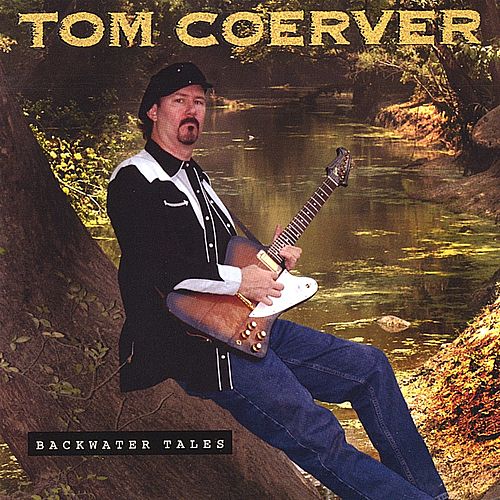
Were you or are you still, in parallel, part of a band?
I was in Catdaddy (early 90s), The Delta Rockets (1996 and 2001), Timewarp (1998 and 2010 to now), Burton Gaar Band (2001-2005 and 2010 to now), Tabby Thomas & The Mighty House Rockers (1998-2000), John Lisi & Delta Funk (1999-2002), Chicago Al (1998-2003) and Groove Unit (2008-2009).
When did you start singing and playing as a band leader?
I didn't like having my name on the sign for gigs and being responsible for putting people in the room and having to be a cheerleader/booze salesman/musician nanny, so I didn't put my own band together until 2003's Tom Coerver & Backwoods BBQ and that only lasted for 9 months until the squabbling and inevitable desire for better paying gigs in cover bands took hold. Then, a few months after that band broke up, my high school classmate Bill Doran moved back to Baton Rouge and wound up working with my Son-In-Law for the Air Force, and Bill had taken up playing bass so we got together with his friend Keith Simoneaux on drums and it clicked well so we started gigging after we recorded the record "Thirds... & More" as a trio. Bill's brother Matt is a great keyboard player, and we got Matt and then Patty Houk to join up and we played gigs from 2005-2008 until Bill moved away for a new day job.
Was "Backwater Tales" in 2003 your first solo album?
Yes, "Backwater Tales" was brewing in the background since around 1996 when I bought a digital workstation to record some demos and take the place of the old TEAC 2340 reel to reel recorder. I also bought a Yamaha Baby Grand Piano around that time, and song ideas started popping up whenever I'd sit down to play the "REAL" piano - there's nothing like the REAL THING!
What made you decide to record?
John Lisi had been coming over to work on ideas for his first solo record, and I played some demos of mine and John kept telling me I HAD to find the time to polish the demos into a commercial-release ready disc, and John helped with many clever production ideas from his experience in Los Angeles studios, and it started sounding so good I felt like I had something coming together that I'd be happy to put my name on.
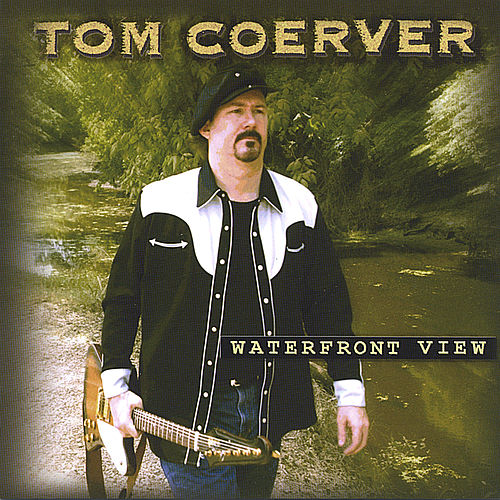
I read that Bobby Ingram came to play on it. Is that correct?
Bobby was too busy with his Molly Hatchet work to play on my stuff, but his rock & roll playing had a very BIG influence on my guitar evolution on the rock side of things. I especially liked the rhythm playing Bobby did on many of the BIP original tunes, and his little pull-offs to open strings and other tricks found their way into the more rock-oriented non-slide guitar work on my CDs.
I don't know this CD or "Waterfront View" (2005). Was it with sidemen like Goin' South?
I played all instruments and did all the singing except for having a few 'special guests' on keyboards, drums, and backing vocals on the "Backwater Tales" CD, "Waterfront View" CD, and the latest CD "Wood, Wire, Vibes... & Slide". I've been doing these kinds of recordings since 1976 when I used two cassette recorders to do "sound on sound recording" where I'd record guitar and then run that cassette recording into a little mixer and add drums into the second cassette recorder and then add the rest by bouncing back and forth between the two cassette recorders and it got much easier in 1978 when I got the beloved TEAC 2340 reel to reel tape recorder with "Simul-Sync" that allowed easier overdub recording and better mixing and then when I got my first digital 8-track recorder in 1996, you can imagine what a stratospheric leap in sound quality, editing, and mixing flexibility that was! I now have a 24-track Roland VS-2480 digital audio workstation (DAW) that I record with and then I usually take the .wav files for the individual tracks to another studio for mixing - I got tired of fighting that battle alone and it makes it so much easier to have a good pair of ears like Devon Kirkpatrick's or Rick Naqvi's to consult and it keeps me from obsessing over the last thing I recorded (usually lead guitar or slide...) at the expense of the overall balance. I did all the recording engineering, mixing and mastering on my first three CDs, and it kept taking longer and longer to get it to the point where I was happy, and I realized from recording with Burton Gaar and other folks that it went much faster and usually wound up being a better result if I collaborated on the mixing and mastering.
Could you tell us a little more about these two discs as well about "Thirds ... & More "(2006) and "From The Mud... To The Sky"(2008), present them to us?
"Backwater Tales" came to life gradually as I started putting together my home recording setup and after I got the nice acoustic piano I started getting ideas for chord progressions and melodies and when my pal John Lisi started coming over to record his tunes, I'd play him things I was working on and his encouragement got me fired up to do my own original songs. I got so burned out on writing and doing demo recordings from 1983 through 1987 with BIP that I thought I'd never write another song and I was happy to just earn a decent living as an Electrical Engineer and computer geek and have fun with music playing cover tunes in weekend bands. Also, I was used to collaborating with Richard Smith, Ron Perry and Bobby Ingram on songs and found it very hard to write lyrics by myself, so the little parts of songs that were floating around in my head didn't start turning into finished songs until about 1996 or so when I was working with another pal named Mike Owings (aka "R.L. Spencer of The Delta Rockets") on some of his songs and his energy got me excited about creating original music again. "Waterfront View" came about as the band "Backwoods BBQ" split up over frustration with the low paying gigs for playing original music, and for a while I just had fun writing and recording at home since I wasn't relying on music to make a living.
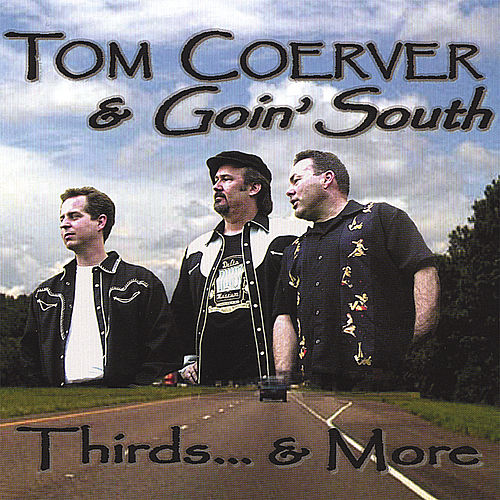
Which CD had been the most successful and which one is your favorite?
"Backwater Tales" and "Thirds... & More" are the best sellers so far. "Backwater Tales" has many fond memories of discovering new tricks for songwriting, recording techniques and some of my favorite instrumental work such as the lead guitar on "Badlands" and the slide guitar on "Backwater Rising" and the solo piano version of "Mississippi Mud" that John Lisi begged and tormented me into doing after I had played keys on his CD "Blues For Chloe". The new CD is probably my overall favorite because it has so many different styles of music that I grew up liking and it came together relatively easily in performance, recording (often more of a fight with equipment breakdowns - this time new gear made it much easier), mixing and mastering.
"Backwater Tales" seems composed entirely with original compositions, records like "Waterfront View" or "From The Mud... To The Sky" include 20% of covers while for "Thirds ... & More" and "Wood, Wire, Vibes... & Slide" there is half of covers. Why does this factor vary so much from one disc to another?
My pal John Lisi suggested that I only do original songs on my first CD and I agreed, the thinking being that I wanted to get the best of the songs I had written up to that point out there for the world to hear and not just let them collect dust on my hard drive! On "Waterfront View", I wanted to do some cover tunes as tributes to the artists that inspired me over the years - especially the Howlin' Wolf, Johnny Winter and Cream factors in "Sittin' On Top Of The World" and the Terry Kath/Early Chicago jazz-rock of the "Sing A Mean Tune, Kid"/"A Hit By Varese" - that stuff really changed my life when my drum teacher Denny Hair exposed me to it and other jazz-rock music in the early early 70s.
The artists who seem to inspire you the most, reading at the credits, are Lynyrd Skynyrd, the Allman Brothers and the Rolling Stones... Are these artists your main influences?
It is so hard to narrow the list of influences down to just three, but many wise folks suggested to keep it at three or less so folks get a quick idea of what you sound like. These three and Creedence Clearwater Revival, Bob Dylan, Jimi Hendrix, ZZ Top, Little Feat and Jeff Beck (and his keyboard players/arrangers!) tend to be among my main influences when it comes to writing songs. The list of instrumental influences is way too long for me to pick less than my "top 100 influences"!
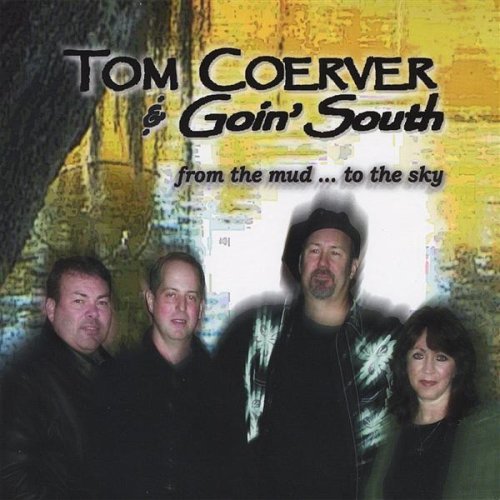
Let's talk now about your new album, "Wood, Wire, Vibes... & Slide". Why did you record it alone, or almost?
My last band Goin' South broke up in 2008 around the time my bass player Bill Doran decided to take a job based in Texas, and around that time I was diagnosed with Prostate Cancer so I just didn't have enough "fuel" left in my tank to deal with putting together a new group after the surgery and all that stuff. You'll notice that I also recorded about half of the tunes on the two Goin' South CDs alone, and that's because I tend to record either early in the morning before my day job, during my lunch break (I live close to the office....), or late at night when I have time available between being "grandpa" to the five grandkids and being a husband to my beautiful wife Esther. I got Patty Houk and Debbie Landry to come in and add background vocals and Dave "The Tube Guy" Long to add harmonica on a few songs on the new CD that needed those sounds and colors and for a little company of friends my little 12' by 17' studio (Baton Rouge Blue Room).
How did you choose the covers?
Mostly by the bands and artists that were big influences, and then I just tried to pick a song of theirs I liked that was at least fairly well known and would flow well with the original songs and instrumentals that I had recorded already.
How came the idea to combine the two "Chevrolet"? Just because of the same title?
Derek Trucks covered the old blues tune "Chevrolet" and I liked his version combined with some of the California flavor that Robben Ford had on his version and I've always loved ZZ Top's song "Chevrolet", so I thought it would be fun to come up with a sextuplet groove for ZZ's song to make it flow out of the old blues tune. That was a fun experiment that worked... I've tried to fit a square peg in a round hole before and it was way harder than this experiment. Those failed experiments will remain in "digital purgatory" on my hard drive!
Were there some covers harder than others to appropriate it by you?
Yes, "Red & Orange" by John Abercrombie (written by Jan Hammer) was very hard to get a handle on, until I found a groove on the drums that felt more like my thing. I've always loved Jack DeJohnette's drumming, but it takes two or three mere mortal drummers to approximate what he can do with two hands and two feet, so I just kept starting over until I found that groove and it started sounding good to me and then I thought of Jan Hammer's cool Fender Rhodes and Mini Moog work on Billy Cobham's "Stratus", and I got the idea to do a "mash-up" of the two tunes and call it "Red & Orange Stratus".
"Red & Orange Stratus" and "Zoot Allures" seem for a while move a little the CD away from your usual blues rock, right?
Yes, I've always liked "spacey, funky, jazzy, dense, and tense" instrumental things and that's how "Decisions" (written in 1981!) wound up on "Waterfront View", "Adrift" wound up on "Thirds... & More", "Fat 'Lanta Strut" wound up on "From the Mud... To The Sky", and "Timeshift", "Red & Orange Stratus" and "Zoot Allures" wound up on the new CD.
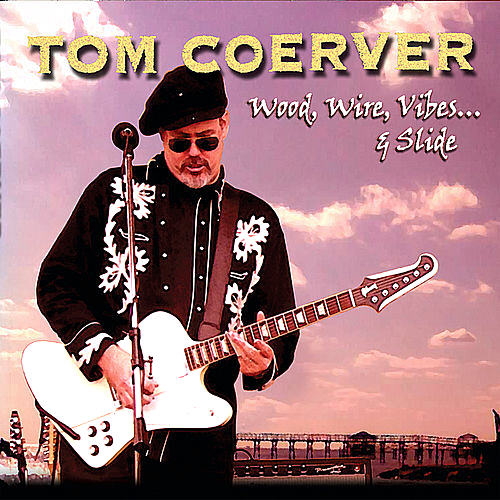
How do you write songs?
Most often I start with an image in my mind that suggests a song title, then I write the lyrics and then the vocal melody and that suggests the chords/harmonies and the groove. Sometimes the songs evolve from little pet licks or chord progressions that I stumble on and that get stuck in my mind until I hear a vocal melody and that suggests a mood and then a lyric.
Do you often play live?
I played a lot on weekends with bands and many Thursday gigs with Tom & Patty up until late 2008 and the surgery slowed me way down. I also hurt my hip pretty bad in summer of 2009, so it wasn't until last year that I started to get back to playing live fairly often.
I guess you mix, there too, many covers and your own material?
Live gigs around Baton Rouge are mostly covers, I sneak in a few of my tunes here and there, but the crowds around here don't respond very well to original music, so I don't push it too hard. Thank God for you Europeans - I guess about 75 percent of my sales are there in Europe.
The keyboards add a lot to your music on disc. Does it lack to you to play only as a trio on stage, without a keyboard player?
I like the challenge of making the music work with just a bass, drums and my guitar like the great power trios from the past - Cream, Hendrix, Gov't Mule, etc. etc. I still play keyboards quite a bit especially lately as I have just rejoined Burton Gaar's band and I'm playing keyboards about 75 percent of the time, and slide guitar about 25 percent of the time along with Ken Harrington on guitar.
What are your plans?
I'll be doing gigs with Timewarp, Burton Gaar and Tom & Patty in 2011 and Burton has some surprises brewing for later in the year.
Can I ask you your Southern rock definition?
Anything that grooves hard, combines elements of blues, rock, rockabilly, jazz, swing, boogie, shuffles, New Orleans second-line, mambo, rhumba, Tejano, Cajun, gothic Gulf Coast, Atlantic Coast, or Pacific Coast storytelling (or inland storytelling from the same regions!), Mountain life, swamp life, backwoods life, big city or small town life. In other words, it doesn't have to come from a certain geographic region, it just has that vibe!
And your favorite Southern rock albums?
"Eat A Peach", "Live At The Fillmore", "Brothers & Sisters", and "Shades Of Two Worlds" by The Allman Brothers Band; "Rio Grande Mud", "Tres Hombres", "Tejas", and "DegŁello" by ZZ Top, Leon Russell's first three LPs, "Bayou Country", "Green River", "Willy & The Poorboys" and "Cosmo's Factory" by Creedence Clearwater Revival; "Johnny Winter", "Second Winter", "Johnny Winter And", "Johnny Winter And - Live", "Still Alive & Well", and "Third Degree" by Johnny Winter; Ry Cooder's first LP, "Sailin' Shoes", "Dixie Chicken", "Feats Don't Fail Me Now", "The Last Record Album", "Waiting for Columbus", "Hoy-Hoy", and "Let It Roll" by Little Feat; "Pronounced", "Second Helping", "Live", and "Street Survivors" by Lynyrd Skynyrd, "Marshall Tucker Band" and "Fire On The Mountain" by the Marshall Tucker Band; Gov't Mule's first four records; and lots of others including Wet Willie, Point Blank, Grinderswitch (Richard, Bobby and I sang backup with Dru Lombar on a session!), Dixie Dregs, Jaco Pastorius, The Flaming Lips (from Oklahoma...), Drive-By Truckers, The Iguanas, Johnny Rivers (nee Ramistella, he grew up in Baton Rouge...), Cold Grits & Black Eyed Peas (Duke Bardwell and Luther Kent's old band), PotLiquor, LeRoux (Jeff Pollard era...) - many many more... my fingers would fall off if I typed them all out!
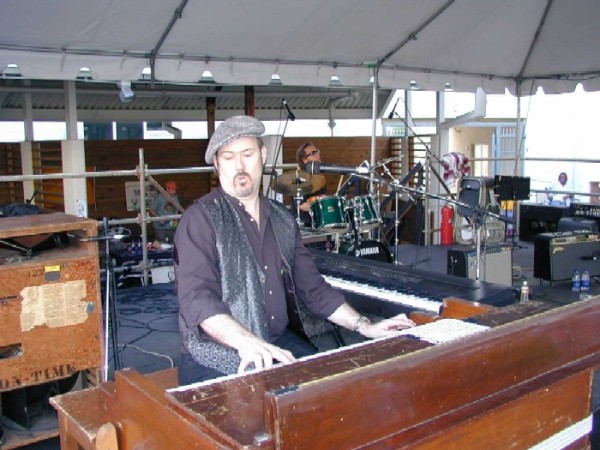
Was the session with Dru Lombar released on disc?
That session was a "hush-hush" set of harmony vocal overdubs on "Edge of Sundown" and a couple other songs on Molly Hatchet's "Live" album "Double Trouble" that Pat Armstrong got us (me, Bobby and Richard Smith) and Dru to double the live harmony vocals to "thicken" the sound in the 80s style (in 1985). We also had fun hanging out with Danny when Pat rented the Full Sail mobile recording truck and they parked it outside Sterling Sound Studios in Jacksonville (Florida...) and did some vocal overdubs on the same record with a CCTV feed from Danny in the main room to the truck outside and we're sitting in the truck watching and listening to Danny yell "Helloooo TEXAS...". That was one of the most hilarious nights of my life... Danny could be really funny when he was in a good mood.
Did you cross paths with Potliquor or Louisiana's LeRoux?
I used to go see Potliquor in clubs around Baton Rouge in 1977-78 or so and they always rocked the house! I never got to know any of the guys, but I wound up buying George Ratzlaff's Fender Rhodes electric piano in 1998 from my pal Bob Sanchez at Live Music. Bob was friends with George before he moved away (I think he's in Florida nowadays...) and he said George was doing well and going where the business took him. Potliquor's drummer Jerry Amoroso had a popular hair salon in Baton Rouge for years, but I'm not sure what he's up to now. As for LeRoux, we all would get together and go see The Jeff Pollard Band back in 1976 or so (before they changed the name to LeRoux) in clubs around here and they did many of the songs that wound up on LeRoux's first record - "Bridge of Silence" was one of my favorites. They also backed up Gatemouth Brown on lots of gigs and that was one hell of a show! LeRoux's drummer David Peters was always one of my favorites and he played with Gatemouth up until Gatemouth passed away shortly after Hurricane Katrina in 2005. Jeff Pollard will always have a special place in my heart for his kindness to me one day in 1976 when I was hanging out at the music shop drooling over guitars and drums when I heard a beautiful ballad in E minor coming from a Stratocaster and despite my shyness at the time, I went over and stared at Jeff playing Hendrix's "Little Wing" and he noticed the look in my eyes and asked me if I played and I told him I was a drummer who "fooled around with the guitar" and he spent the time to teach me the intro to Little Wing with all the cool hammer-ons and pull-offs and I use lots of those figures to this day. When Jeff left LeRoux to become a minister, they went through several vocalists until they found Randy Knaps in the late 80s and when I moved back to Baton Rouge in 1988, I wound up playing in a band called Cool Toys for a few months with Randy as the singer. Besides being a great singer and entertainer, Randy is a real character - we were playing a tune at a gig and I heard a harmonica and I thought "where the hell is that coming from... nobody plays harp" and then I looked up to see Randy grinning and cupping his hands around his mouth to make the harmonica sounds. Randy is now the "king of car commercials" around the entire Gulf Coast area and still doing LeRoux gigs every now and then.
There are many talks of declining CD sales and illegal downloading problems. At your level, do you feel the consequences?
I think that video games, DVD movies, cable television, the internet (!!!), and other competing forms of entertainment combined with the overwhelming number of CDs and .mp3s being released (legal and illegal) thanks to the advent of cheap, high-quality multitrack digital recording and mixing equipment and software and cheap distribution through CD Baby etc. and online downloading (legal and illegal) and the splintering of radio into so many different formats each with their small niche along with the lack of a "new trend" like grunge in the 90s or rap in the 80s or Britney in the 00s that captures folks attention is most to blame for everyone's (big artist and small artist alike) declining sales and fortunes.
Your website is outdated, is it abandoned?
I am guilty of not making time or dedicating money to update my web site since 2006 or so, but I still get emails from a few folks through the contacts link on the www.tomcoerver.com site and that always inspires me to want to update it but I seem to get lazy and just upload a few pictures every now and then and call that "updating". I need to find a webmaster or a typist!!!
Thank you Tom.
Thanks for your interest, Luc and Company! If it were not for Europeans (especially France, Germany, Italy, the former "Iron Curtain" countries, etc.) and vicinity, I probably wouldn't have recorded or released anything after "Backwater Tales" because the USA doesn't seem too interested in this type of music any longer. I sure appreciate y'all.
